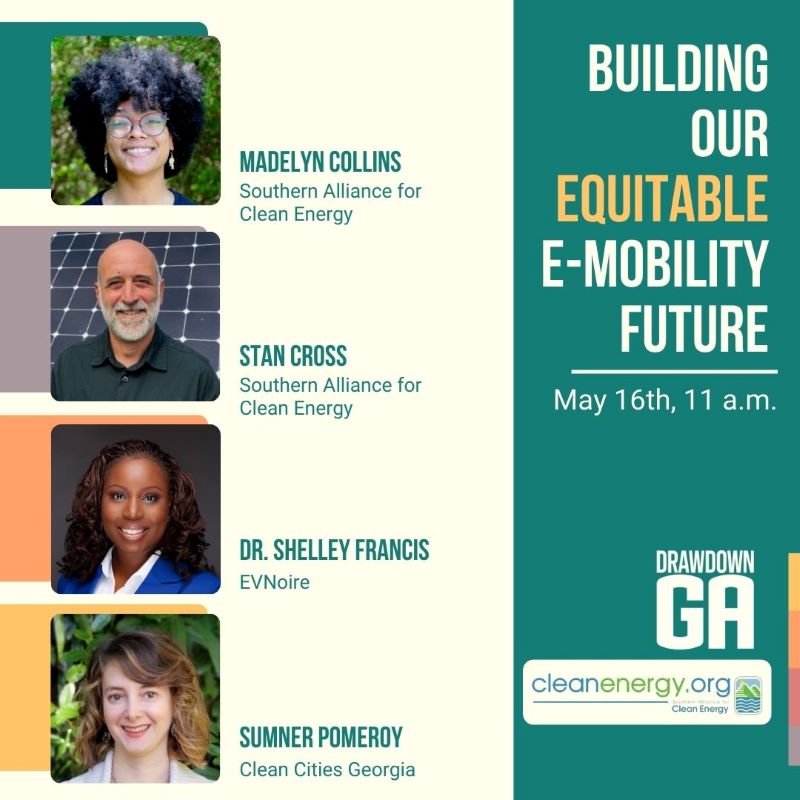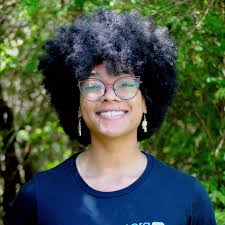Electric Black Futures is a new initiative that seeks to support and empower underserved Black communities in Albany, Atlanta, and Savannah, Georgia, to envision and create their electric mobility future.
What makes this project important, and how it can help us expand e-mobility to lower GHG emissions and advance equity in Georgia simultaneously?
Building Our Equitable E-Mobility Future
To celebrate the launch of Electric Black Futures, Drawdown Georgia co-hosted a conversation with the Southern Alliance for Clean Energy (SACE), a nonprofit organization that promotes responsible and equitable energy choices to ensure clean, safe, and healthy communities throughout the Southeast. SACE is one of the main partners behind the new initiative.
The webinar included a panel discussion moderated by SACE’s Electric Transportation Director Stan Cross, with SACE’s Electric Transportation Equity Manager Madelyn Collins, EVNoire Co-Founder and Managing Partner Dr. Shelley Francis, and Clean Cities Georgia Program Manager Sumner Pomeroy.
The panel discussion introduced the public to the Electric Black Futures initiative and went deeper in discussing the project’s goals and approach.
Watch the full recording below, or keep reading to learn more. Want to stay in the loop about upcoming Drawdown Georgia events? Subscribe now to the Georgia Climate Digest.
Electric Black Futures: Background + Goals
In October 2023, the Southern Alliance for Clean Energy (SACE), along with partners EVNoire and Clean Cities Georgia, received a $1.4 million grant from the U.S. Department of Energy’s Vehicle Technologies Office Program Wide Funding Opportunity that funded the creation of Electric Black Futures.
The project aims to ensure that underserved Black communities within three Georgia cities – Albany, Atlanta, and Savannah – are actively engaged and empowered to create and deploy equitable, accessible electric mobility initiatives and gain access to the jobs that the transition to electric transportation is bringing to Georgia.
Electric Black Futures will leverage community-based participatory research and authentic community engagement to identify and understand community needs and priorities, develop community-centered strategic plans, and empower community voices to ensure that electric mobility investments from federal programs such as the Bipartisan Infrastructure Law (BIL) and the Inflation Reduction Act (IRA) deliver what communities need and want.

The specific goals of the project for the next three years include:
-
Leveraging community-based participatory research and engagement to co-create community-centered electric mobility plans that connect Black communities to federal funding and clean energy jobs. Emphasis is also placed on projects that address the disproportionate environmental and transportation burdens that impact Black communities’ social and economic well-being.
-
Empowering future-building electric mobility coalitions in Black communities to envision and lead their electric mobility futures to center the lived experiences of Black people in technological innovation.
-
Creating green jobs and supporting entrepreneurship for workers and thinkers in Black communities to help find pathways for upward mobility and economic empowerment.
Laying the Groundwork for Equitable E-Mobility
Over the past six months, the project team has been meeting with stakeholders in Albany, Atlanta, and Savannah to enlist representative partners, including grassroots organizations such as SOWEGA Rising and Black Sustainability, Inc., anchor institutions like the United Way of Southwest Georgia, and communication partner Subsume Studios.
The team continues to meet with community-based organizations in these three cities to enlist more partners and participants before the project’s formative research stage launches in June. This stage will include community surveys and focus groups.
Electric Black Futures will establish Community Advisory Boards of local partners to help lead engagement with the cities’ underserved Black communities. The qualitative and quantitative data gathered during this stage will inform community engagement throughout the project.
Next Steps for Electric Black Futures
In addition to developing strategic plans and identifying pathways to electric mobility project funding, the project will also engage education partners, including the Technical Community College System of Georgia, as well as local Historically Black Colleges and Universities, to identify job skill gaps and ensure communities have access to the job training needed to participate in the state’s booming electric transportation sector.
The success of this initiative will help inform and achieve the objectives of Justice40, a goal set by the Biden administration that seeks to deliver 40% of the benefits from national clean energy and climate investments to underserved communities disproportionately affected by environmental and socioeconomic challenges.
Electric Black Futures will continue to be informed by ongoing research and by what is heard from authentic community voices. The project partners look forward to constantly discovering new community electric mobility needs and priorities. Learning in real-time is what makes this project so unique and exciting, and we are looking forward to seeing how this work will unfold in Georgia over the next three years.
To participate in and stay connected to the project, visit ElectricBlackFutures.org.





